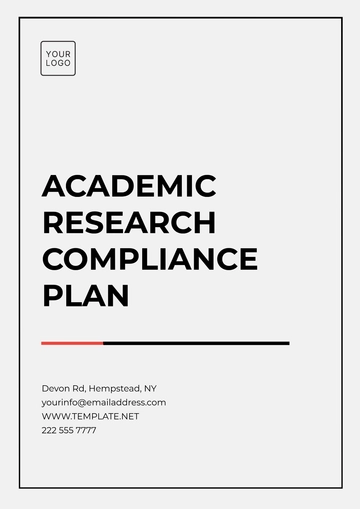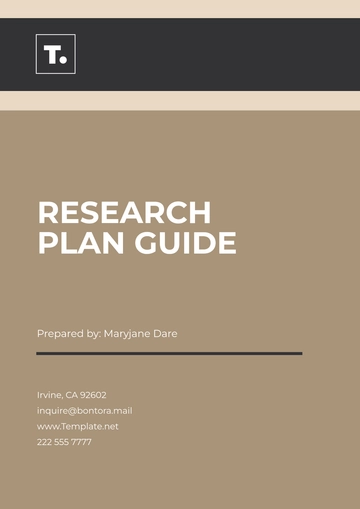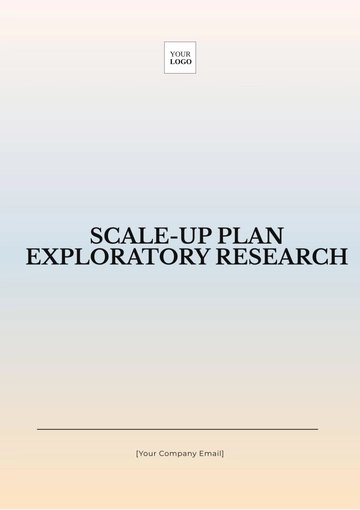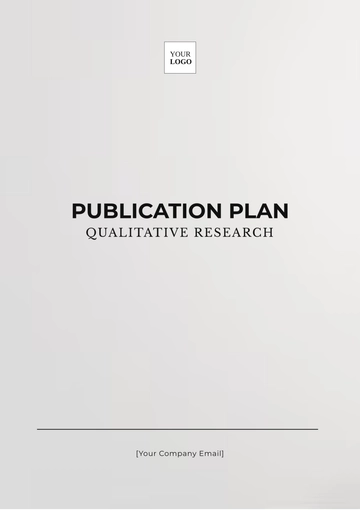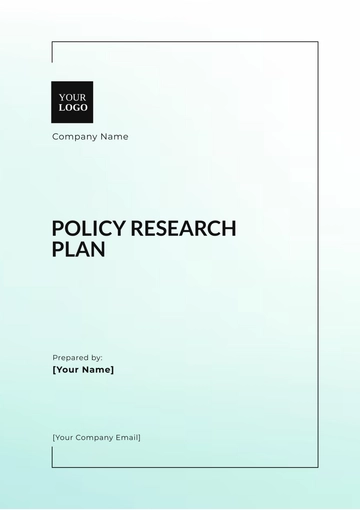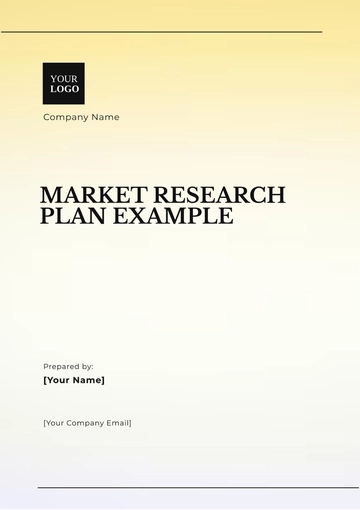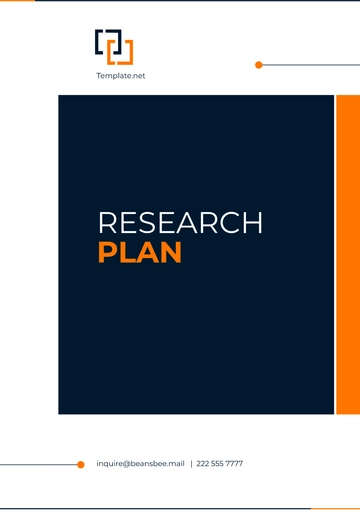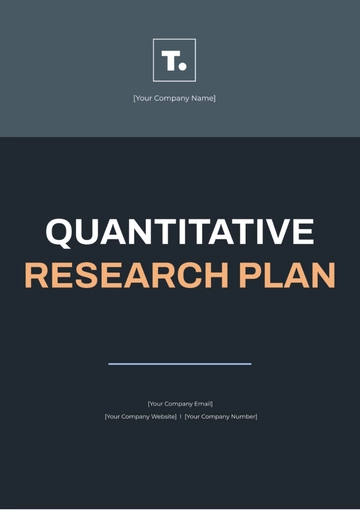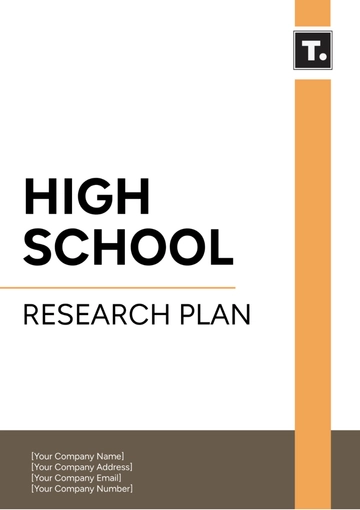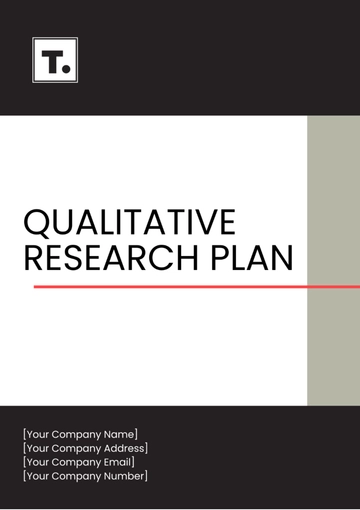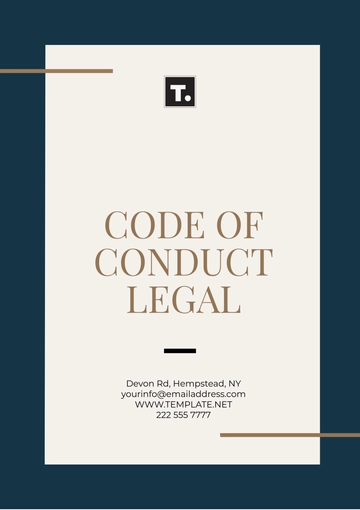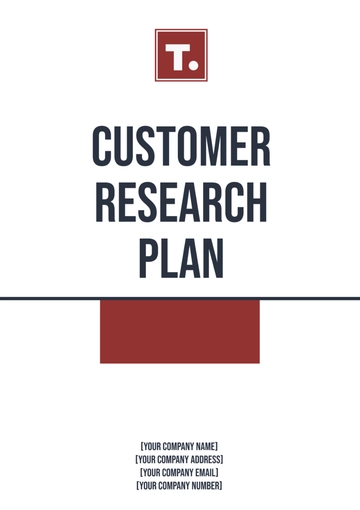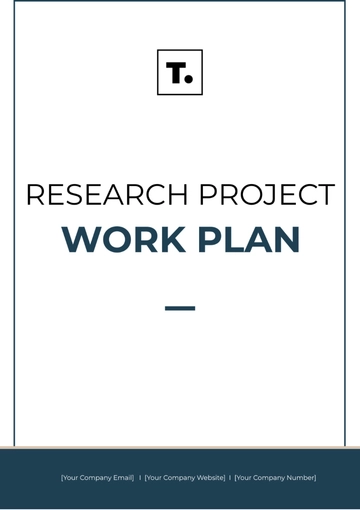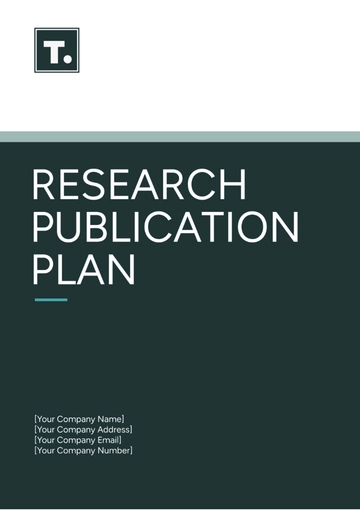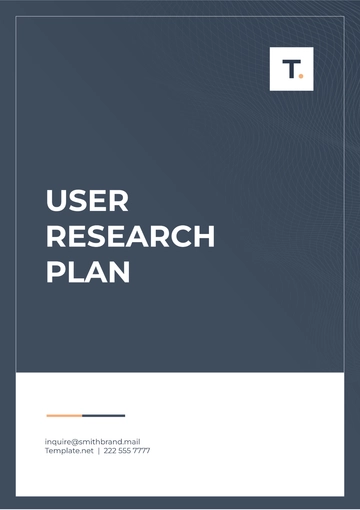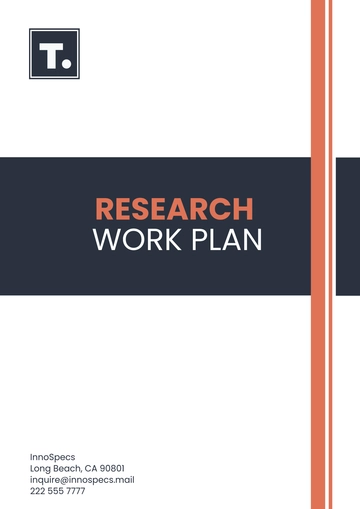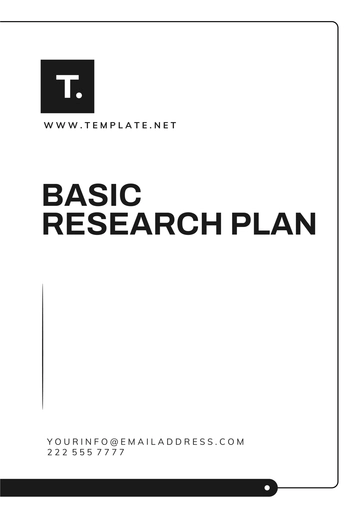Free Academic Research Compliance Plan
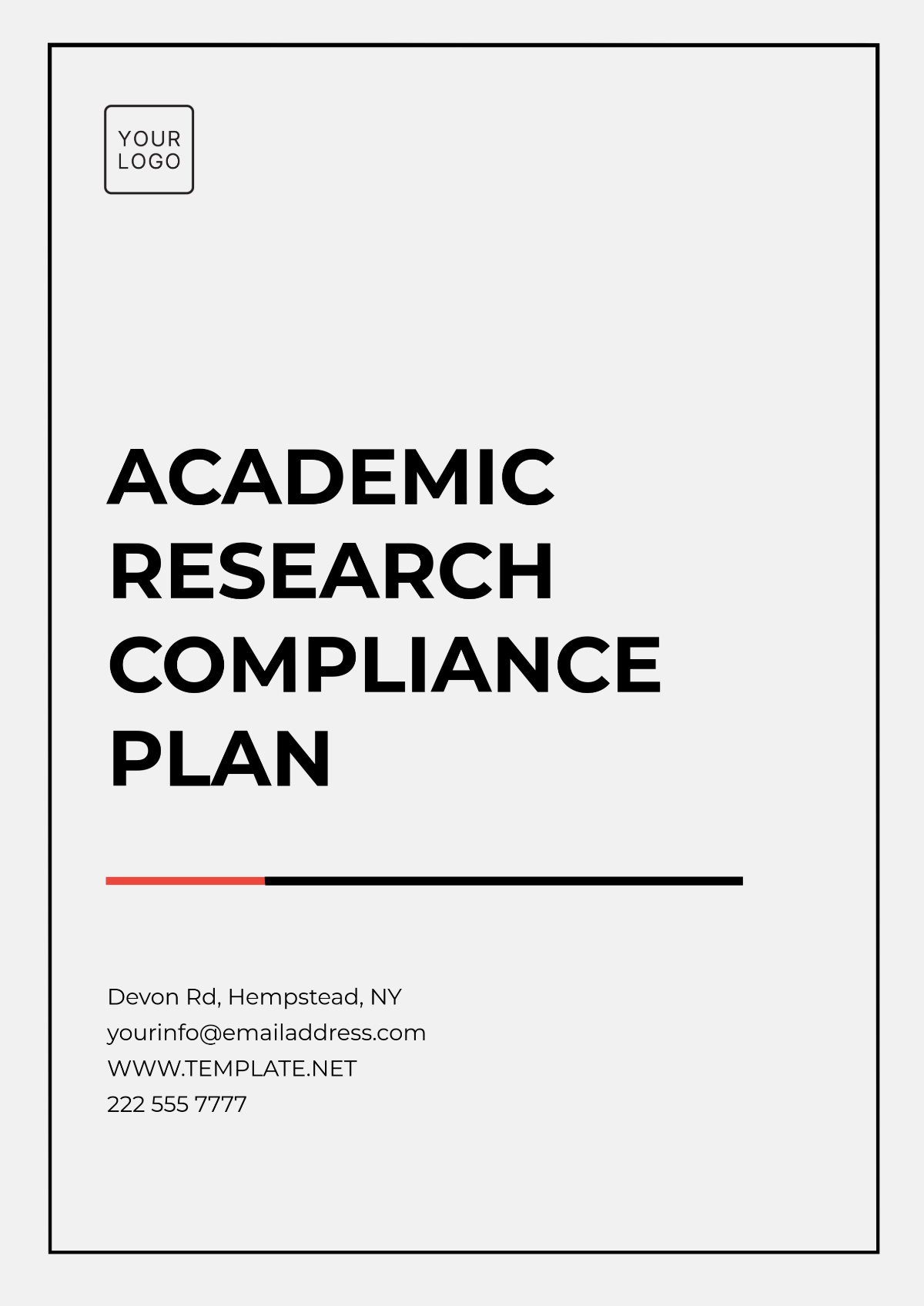
Date: [Date]
Prepared By: [Your Name]
I. Introduction
The purpose of this Academic Research Compliance Plan is to ensure that all research activities conducted within the academic institution adhere to legal, ethical, and institutional guidelines. The plan provides a framework for complying with laws and regulations governing research, including those related to human and animal subjects, data management, intellectual property, and conflict of interest.
II. Purpose
This plan outlines the procedures for ensuring that all academic research is conducted in compliance with applicable regulations, best practices, and ethical standards. It aims to foster transparency, integrity, and accountability in all stages of the research process.
III. Scope
This plan applies to all researchers, faculty, staff, and students involved in academic research projects at the institution. The following key areas are covered:
Ethical approval for research involving human and animal subjects
Data management and protection
Intellectual property and copyrights
Conflict of interest management
Research misconduct policies
IV. Compliance Requirements
1. Ethical Approval
Human Subjects Research: All research involving human participants must receive prior approval from the Institutional Review Board (IRB). Researchers are required to submit detailed protocols, informed consent forms, and risk assessments.
Animal Subjects Research: Research involving animal subjects must be approved by the Institutional Animal Care and Use Committee (IACUC). Researchers must ensure the humane treatment of animals and comply with relevant ethical guidelines.
2. Data Management
Data Security: Research data must be stored securely, with access limited to authorized personnel. Sensitive data, including personally identifiable information (PII), must be protected in compliance with privacy laws.
Data Integrity: Researchers are required to maintain accurate and complete records of their data and research findings. Any changes to the data must be documented and justified.
3. Intellectual Property
Ownership: The institution's policies on intellectual property must be followed. Researchers must disclose any inventions, patents, or copyrights arising from their research.
Licensing and Commercialization: If applicable, researchers must work with the institution's technology transfer office to assess potential commercialization opportunities and licensing agreements.
4. Conflict of Interest
Researchers must disclose any financial or personal interests that may present a conflict of interest. Conflicts of interest should be reported to the institution's conflict of interest committee for review and mitigation.
5. Research Misconduct
Plagiarism, Fabrication, and Falsification: Researchers must adhere to strict ethical standards and avoid any form of research misconduct. Violations will result in disciplinary action in accordance with the institution's policies.
Reporting Misconduct: Any suspected misconduct must be reported to the appropriate institutional authorities for investigation and resolution.
V. Compliance Training and Education
All researchers must complete mandatory training on research compliance. This includes topics such as ethical research practices, data security, and conflict of interest management. Regular workshops and seminars will be held to reinforce compliance requirements and foster a culture of ethical research.
VI. Monitoring and Auditing
The compliance office will conduct periodic audits of ongoing research projects to ensure adherence to the compliance plan. Researchers are required to submit regular progress reports and any necessary documentation for review.
VII. Roles and Responsibilities
Principal Investigators (PIs): Ensure that research complies with ethical guidelines, institutional policies, and applicable laws. Responsible for obtaining necessary approvals and conducting the research in accordance with this plan.
Institutional Review Board (IRB): Reviews and approves research involving human subjects to ensure ethical and legal compliance.
Institutional Animal Care and Use Committee (IACUC): Reviews and approves research involving animals, ensuring the ethical treatment of animals and compliance with applicable regulations.
Compliance Officer: Oversees the institution’s research compliance program, providing guidance, conducting audits, and ensuring adherence to all policies.
VIII. Reporting and Feedback
Any issues or concerns related to compliance should be reported to the compliance office or through the institution’s anonymous reporting system. The institution encourages open communication to maintain ethical standards and address challenges promptly.
IX. Conclusion
This plan outlines the necessary steps to maintain high standards of compliance in academic research. By adhering to these guidelines, the institution aims to foster a culture of ethical, transparent, and responsible research practices.
- 100% Customizable, free editor
- Access 1 Million+ Templates, photo’s & graphics
- Download or share as a template
- Click and replace photos, graphics, text, backgrounds
- Resize, crop, AI write & more
- Access advanced editor
The Academic Research Compliance Plan Template, offered by Template.net, is a fully customizable and downloadable tool designed to streamline your research compliance process. This template is editable in our AI Editor Tool, allowing you to tailor it to your specific needs. With its printable format, it ensures that you can easily share and present your compliance plan in a professional manner. Perfect for researchers looking to ensure adherence to academic standards.
You may also like
- Finance Plan
- Construction Plan
- Sales Plan
- Development Plan
- Career Plan
- Budget Plan
- HR Plan
- Education Plan
- Transition Plan
- Work Plan
- Training Plan
- Communication Plan
- Operation Plan
- Health And Safety Plan
- Strategy Plan
- Professional Development Plan
- Advertising Plan
- Risk Management Plan
- Restaurant Plan
- School Plan
- Nursing Home Patient Care Plan
- Nursing Care Plan
- Plan Event
- Startup Plan
- Social Media Plan
- Staffing Plan
- Annual Plan
- Content Plan
- Payment Plan
- Implementation Plan
- Hotel Plan
- Workout Plan
- Accounting Plan
- Campaign Plan
- Essay Plan
- 30 60 90 Day Plan
- Research Plan
- Recruitment Plan
- 90 Day Plan
- Quarterly Plan
- Emergency Plan
- 5 Year Plan
- Gym Plan
- Personal Plan
- IT and Software Plan
- Treatment Plan
- Real Estate Plan
- Law Firm Plan
- Healthcare Plan
- Improvement Plan
- Media Plan
- 5 Year Business Plan
- Learning Plan
- Marketing Campaign Plan
- Travel Agency Plan
- Cleaning Services Plan
- Interior Design Plan
- Performance Plan
- PR Plan
- Birth Plan
- Life Plan
- SEO Plan
- Disaster Recovery Plan
- Continuity Plan
- Launch Plan
- Legal Plan
- Behavior Plan
- Performance Improvement Plan
- Salon Plan
- Security Plan
- Security Management Plan
- Employee Development Plan
- Quality Plan
- Service Improvement Plan
- Growth Plan
- Incident Response Plan
- Basketball Plan
- Emergency Action Plan
- Product Launch Plan
- Spa Plan
- Employee Training Plan
- Data Analysis Plan
- Employee Action Plan
- Territory Plan
- Audit Plan
- Classroom Plan
- Activity Plan
- Parenting Plan
- Care Plan
- Project Execution Plan
- Exercise Plan
- Internship Plan
- Software Development Plan
- Continuous Improvement Plan
- Leave Plan
- 90 Day Sales Plan
- Advertising Agency Plan
- Employee Transition Plan
- Smart Action Plan
- Workplace Safety Plan
- Behavior Change Plan
- Contingency Plan
- Continuity of Operations Plan
- Health Plan
- Quality Control Plan
- Self Plan
- Sports Development Plan
- Change Management Plan
- Ecommerce Plan
- Personal Financial Plan
- Process Improvement Plan
- 30-60-90 Day Sales Plan
- Crisis Management Plan
- Engagement Plan
- Execution Plan
- Pandemic Plan
- Quality Assurance Plan
- Service Continuity Plan
- Agile Project Plan
- Fundraising Plan
- Job Transition Plan
- Asset Maintenance Plan
- Maintenance Plan
- Software Test Plan
- Staff Training and Development Plan
- 3 Year Plan
- Brand Activation Plan
- Release Plan
- Resource Plan
- Risk Mitigation Plan
- Teacher Plan
- 30 60 90 Day Plan for New Manager
- Food Safety Plan
- Food Truck Plan
- Hiring Plan
- Quality Management Plan
- Wellness Plan
- Behavior Intervention Plan
- Bonus Plan
- Investment Plan
- Maternity Leave Plan
- Pandemic Response Plan
- Succession Planning
- Coaching Plan
- Configuration Management Plan
- Remote Work Plan
- Self Care Plan
- Teaching Plan
- 100-Day Plan
- HACCP Plan
- Student Plan
- Sustainability Plan
- 30 60 90 Day Plan for Interview
- Access Plan
- Site Specific Safety Plan
